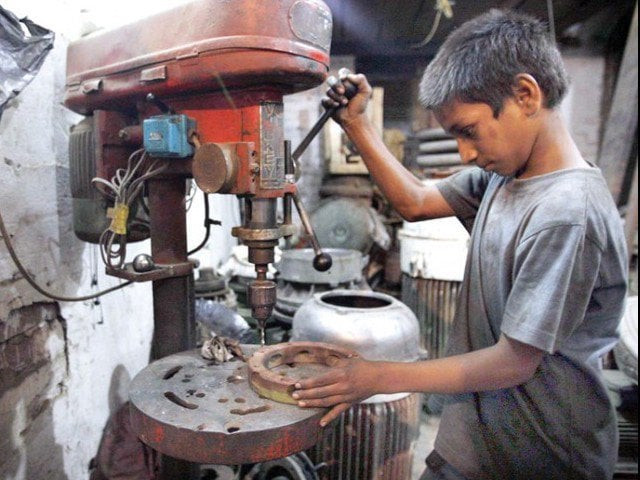Doctors may be using tools made by children in Pakistan, admits UK's top hospital
Britain is the third largest buyer of surgical instruments from Pakistan

A child labourer operates a drill machine at a workshop in Lahore. PHOTO: APP/FILE
Illegal child labour was witnessed in at least a dozen small workshops in Sialkot, the north-eastern city of Punjab, where 99% of the country’s surgical instrument production is centred.
Boys are paid less than $1 a day to cut, drill, bend and polish steel pieces into gleaming surgical tools for export.
Inside the cramped workshops, metal dust is everywhere and the noise of the grinders, polishers and generators is deafening. But there is no sign of protective goggles, earphones, masks or other safety equipment.
Three companies that export to the UK said they buy instruments from these workshops.
ICT plans to end child labour in capital
The evidence has ignited fears in Britain that tools used routinely in the National Health Service (NHS) operating theatres and consulting rooms are made with child labour.
NHS Supply Chain, among the largest suppliers to the NHS, bans child labour from its “first tier” suppliers, most of whom are based in the UK. However, it admitted it does not know which manufacturers are used in Pakistan.
Doctors, politicians and a labour rights group, the Ethical Trading Initiative, say more must be done to ensure child labour is not found in the NHS supply chain.
Britain is the third largest buyer of surgical instruments from Pakistan, accounting for 10% of the country’s total exports. In all, 80%-90% of surgical instruments are manufactured in the country, according to NHS Supply Chain.
Civil society declares child labour as worst form of slavery
Cindy Berman, head of modern slavery strategy at the Ethical Trading Initiative, said: “We know child labour exists in the surgical instrument sector in Pakistan, often in the initial stages of production, and it’s likely that some of these instruments will end up here in the UK."
The Pakistan export market in surgical tools is worth $358m (£255m), a tiny slice of a lucrative global market worth $17bn. Most of it is based in Sialkot, but local manufacturers receive only a small portion of the revenue, while outsourcing importers make the largest profits.
Iram Zafar, secretary general of the Surgical Instruments Manufacturers Association of Pakistan (Simap), said the sector had produced and exported more than 15,000 pieces to the UK between July and December last year, worth $11.4m.
Pakistan has signed up to the UN’s sustainable development goals, which call for an end to child labour by 2025. Punjab laws ban under 18s from working in “hazardous industries”, and children under 14 from working at all.
Nearly one in 10 children globally is a victim of forced labour: UN study
While no official survey has been carried out in Pakistan since 1996, the underage workforce is estimated at between 5.7 and 12.5 million.
Zain, 12, who began work in one of Sialkot’s surgical instrument shops eight months ago after his father died, works eight hours a day, six days a week to bring home $25 a month.
“I know it’s dangerous, but I have to pay some debts and support my family,” he said.
At busy times, he can work as many as 12 hours a day. At night, the children often suffer from dry coughs, asthma and other respiratory problems.
The workshop’s owner, who declined to be named, said his business had never been inspected by the Punjab Labour Department in 25 years. He acts as a sub-contractor for the city’s larger factories, but refused to provide names.
NHS Supply Chain said it does not know which manufacturers its suppliers use in Pakistan. Neither does it require its suppliers to audit their Pakistani suppliers, although it said that some do.
The Guardian wrote to 22 of NHS Supply Chain’s “first tier” suppliers asking if they source instruments from Sialkot. Only six replied, one of which said it did not supply to the NHS. Two confirmed they did source instruments from Sialkot and three said they did not. NHS Supply Chain confirmed 11 of its suppliers source from Pakistan, but declined to give company names.
A spokeswoman said NHS Supply Chain was committed to working with suppliers serious about managing labour standard issues in their supply chains, but accepted more needed to be done.



















COMMENTS
Comments are moderated and generally will be posted if they are on-topic and not abusive.
For more information, please see our Comments FAQ